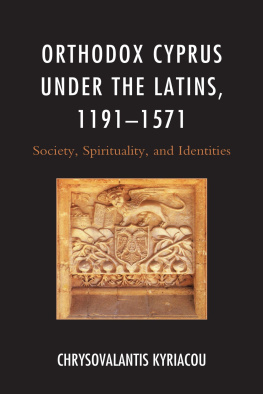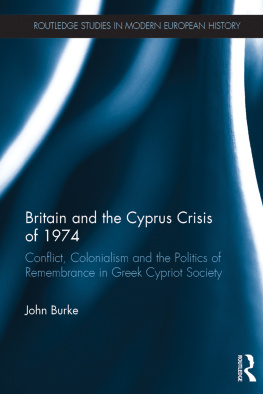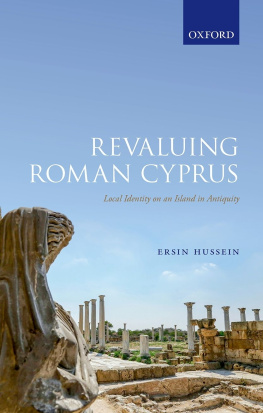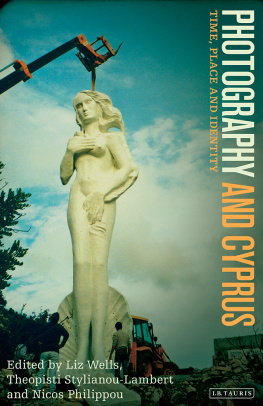Orthodox Cyprus under the Latins, 11911571
Byzantium: A European Empire and Its Legacy
Series Editor: Vlada Stankovi (University of Belgrade)
The series explores the rich and complex history, culture, and legacy of the longest lasting European state, its place in the Middle Ages, and in European civilization. Through positioning Byzantine history in a wider medieval context, the series will include new perspectives on the place of the eastern Mediterranean; Central, Eastern, and South Europe; and the Near East in the medieval period. The intention is not simply to place the Byzantine Empire in the Western sphere, but rather to call for a reorientation away from the traditional East-West divide and to bring Byzantium out of its isolation from the rest of the medieval world. Byzantium: A European Empire and Its Legacy seeks both monographs and edited collections that bring Byzantine studies into conversation with scholarship on the Western medieval world, as well as other works on the place of the Byzantine Empire in the global Middle Ages.
Titles in the Series
The Balkans and the Byzantine World before and after the Captures of Constantinople, 1204 and 1453 , edited by Vlada Stankovi
Conflict, Bargaining, and Kinship Networks in Medieval Eastern Europe , by Christian Raffensperger
Orthodox Cyprus under the Latins, 11911571: Society, Spirituality, and Identities , by Chrysovalantis Kyriacou
Orthodox Cyprus under the Latins, 11911571
Society, Spirituality, and Identities
By
Chrysovalantis Kyriacou
LEXINGTON BOOKS
Lanham Boulder New York London
Published by Lexington Books
An imprint of The Rowman & Littlefield Publishing Group, Inc.
4501 Forbes Boulevard, Suite 200, Lanham, Maryland 20706
www.rowman.com
6 Tinworth Street, London SE11 5AL, United Kingdom
Copyright 2018 The Rowman & Littlefield Publishing Group, Inc.
All rights reserved . No part of this book may be reproduced in any form or by any electronic or mechanical means, including information storage and retrieval systems, without written permission from the publisher, except by a reviewer who may quote passages in a review.
British Library Cataloguing in Publication Information Available
Library of Congress Cataloging-in-Publication Data Available
ISBN 978-1-4985-5115-1 (cloth : alk. paper)
ISBN 978-1-4985-5116-8 (electronic)
 The paper used in this publication meets the minimum requirements of American National Standard for Information SciencesPermanence of Paper for Printed Library Materials, ANSI/NISO Z39.48-1992.
The paper used in this publication meets the minimum requirements of American National Standard for Information SciencesPermanence of Paper for Printed Library Materials, ANSI/NISO Z39.48-1992.
Printed in the United States of America
Contents
This book began as a doctoral dissertation at the Hellenic Institute of Royal Holloway, University of London (201216). First of all, I would like to thank my doctoral supervisor, Dr. Charalambos Dendrinos, for his continuous support and encouragement. Insightful comments and suggestions were kindly put forth by my advisors, Drs. David Gwynn and Georgios Christodoulou. My deep thanks are also extended to my examiners, Professors Richard Price and Costas N. Constantinides, for their constructive criticisms and valuable corrections. I gratefully acknowledge the financial support I received from the A. G. Leventis Foundation and the Holy Church of Panaghia Phanermen (201214) during my doctoral studies. I would also like to thank the Hellenic Institute for awarding me The Joan Mervyn Hussey Memorial Prize (2012) and The Ecumenical Patriarch of Constantinople Bartholomaios I Postgraduate Studentship (201213).
In the course of my writing I received encouragement and expert advice from a number of scholars, whom I would like to thank: Professors Jonathan Phillips, Aristeides Papadakis, Demetrios D. Triantaphyllopoulos, Nikolaos Moschonas, Graeme Murdock, Tassos Kaplanis, Maria Gabriella Arru, Christopher D. Schabel, Angel Nicolaou-Konnari, and Michalis Olympios; Drs. Nasa Patapiou, Ioanna Hadjicosti, Christodoulos Hadjichristodoulou, Panos Christodoulou, Despoina Ariantzi, and Giorgos Papantoniou; Mr. Andreas Loizou, Mrs. Margarita Papantoniou, and Fr. Gregorios Ioannides. I am also deeply indebted to Mrs. Jacqueline-Westwood Demetriades for her linguistic services, and to Mrs. Naso Kalli Stergenaki for designing the maps.
I am particularly grateful to the Cyprus Department of Antiquities, Bank of Cyprus Cultural Foundation, and Eton College Library for granting their permission for the reproduction of images. The examination and critical edition of the Greek texts in Appendices IIII was based on digital facsimiles provided by the Biblioteca Apostolica Vaticana, the Stauronikta Monastery Library, and Eton College Library. The Stauronikta monks also kindly offered their hospitality during my preliminary examination of the manuscript containing Patriarch Kallistos Encyclical in 2012.
Special thanks should be given to Vlada Stankovi for his proposal to publish with Lexington Books, and for his helpful suggestions in how to turn my dissertation into a monograph. Brian Hill and Eric Kuntzman oversaw production of the book, providing expert assistance and editorial advice. I owe many thanks to the anonymous reviewers of Lexington Books for their valuable comments and remarks.
The present book would have been impossible to write without my familys support; it is to them that this study is dedicated. To Fr. Marios Demosthenous, my , I owe deep and sincere thanks for helping me keep my life in balance, even when things seemed to go wrong. To my parents, sister, and grandfather, I owe my deepest gratitude: their unconditional love has been a constant source of moral strength. Baby Evridiki closely oversaw the final stages of the revision process, offering editorial assistance. Finally, my wife Maria has been an indefatigable companion throughout my journeys in the footsteps of medieval monks, bishops, and pilgrims. She was patient when I was not, and she lovingly understood that, like the mythical Antaeus, I too, draw strength from the land where I was born.
March 4, 2018
Sunday of St. Gregory Palamas
The transliteration of Greek names into English generally follows the Library of Congress system, available at https://www.loc.gov/catdir/cpso/romanization/greek.pdf (last accessed July 8, 2017). I have used the Anglicized form of Greek, Latin, and French names that passed into common English usage (e.g., John for Ianns, Eugene for Eugenius, and Philip for Philippe), but preserved Italian and Italicized forms of names (e.g., Pietro for Peter, and Synglitico for Syngltikoi).

Map 1Cyprus. Stergenakis Digital Printing Ltd.

Map 2Eastern Mediterranean. Stergenakis Digital Printing Ltd.
The Hadjigeorgakis Kornesios mansion is situated in a quiet street in intra muros Nicosia. Named after its powerful owner, who served the Ottomans as an interpreter before his downfall and execution in 1809, the fortress-like mansion (today Nicosias Ethnological Museum) is one of the most emblematic buildings of the Cypriot capital. The visitor or passerby often stands for a moment to gaze at the relief decorating the upper part of the entrance (see cover image). Being a visible reminder of the Podocataro (the wealthy Greek family of merchants, nobles, scholars, and cardinals who lived there during the fifteenth and sixteenth centuries), the relief becomes itself a symbolic gateway to the lost world of Latin-ruled Cyprus, a world of symbiosis and tension, tolerance and intolerance, identity preservation and identity adaptation.








 The paper used in this publication meets the minimum requirements of American National Standard for Information SciencesPermanence of Paper for Printed Library Materials, ANSI/NISO Z39.48-1992.
The paper used in this publication meets the minimum requirements of American National Standard for Information SciencesPermanence of Paper for Printed Library Materials, ANSI/NISO Z39.48-1992.
